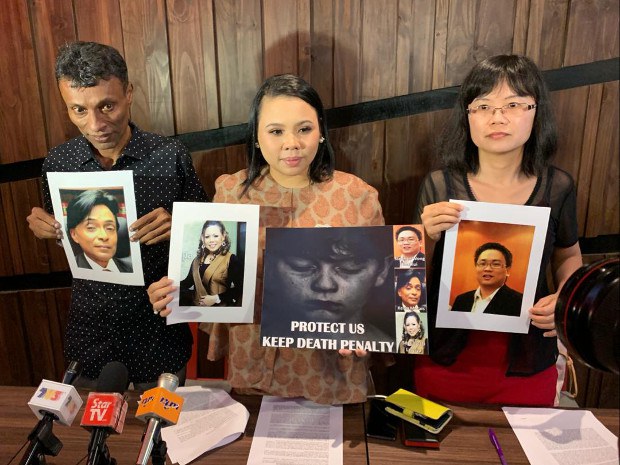Families of Malaysian Murder Victims Ask Government to Keep Death Penalty
2018.11.09
Kuala Lumpur
 Family members display photos of murder victims (from left), Kevin Morais, Sosilawati Lawiya and Wong Jing Kui speak to reporters in Kuala Lumpur, Nov. 9, 2018.
Family members display photos of murder victims (from left), Kevin Morais, Sosilawati Lawiya and Wong Jing Kui speak to reporters in Kuala Lumpur, Nov. 9, 2018.
Family members of three murder victims urged the government Friday not to abolish the death penalty, a day after a Malaysian delegation faced the United Nations Universal Periodic Review in Geneva and agreed to abide by a moratorium on executions.
About 1,200 prisoners were on death row as October in the Muslim-majority nation, according to Malaysian officials.
Erni Dekritawati Yuliana, the oldest daughter of murdered cosmetic mogul Sosilawati Lawiya, said she understood the government’s efforts to better protect human rights in the country, but disagreed with efforts to ban capital punishment.
Relatives of murder victims Kevin Morais, a former deputy public prosecutor; and banker Wong Jing Kui joined Erni during a news conference in Kuala Lumpur.
“It is so unfair to (murdered) family victims to abolish the death penalty,” Erni told reporters, while emphasizing that she agreed with efforts to improve human rights in Malaysia.
Sosilawati and three others were beaten to death by her former lawyer and two farm hands, before their remains were burned to ashes in a case that gripped the nation in 2010. The defendants exhausted their chances to appeal after the Federal Court upheld the death penalty.
On Thursday during its third review by the U.N. Human Rights Council in Geneva, Malaysian representatives reaffirmed the government’s decision to ratify all remaining U.N. rights treaties and to establish a moratorium on all executions until the death penalty is abolished.
Malaysian Human Rights Commission commissioner Jerald Joseph, who was part of the Malaysian delegation, told BenarNews he sympathized with the families.
“I can understand their pain, but the death penalty is not deterrence to those horrible crimes,” Joseph said.
Government officials could not be reached for comment Friday to respond to the families.
Last month, Liew Vui Keong, cabinet minister in charge of law, said the government of Prime Minister Mahathir Mohamad decided to abolish death penalty with no exceptions.
“New Malaysia, new look, new hope where everyone has a right of life,” Liew said on Oct. 10, underscoring that the new Malaysian view was in line with the internationally accepted convention on human rights.
Malaysia’s move, announced during an event commemorating the World Day Against the Death Penalty, spurred positive comments from U.N. chief Antonio Guterres, who described it as a stride toward eliminating the death penalty worldwide.
About 170 nations have implemented a moratorium or ended the practice of the death penalty, Stéphane Dujarric, Guterres’s spokesman, said in a statement.
Brother speaks out
Richard Morais, the slain prosecutor’s younger brother, said those who have lost loved ones through horrific deaths have a special bond.
“You have to lose a family member to murder to understand,” Richard Morais said as tears rolled down his cheeks while recounting his brother’s murder.
Kevin Morais, an employee at the attorney general’s office, was abducted while he traveling to his office on Sept. 4, 2015. His remains, entombed in a concrete-filled barrel, were found 12 days later in a suburb outside Kuala Lumpur.
“His whole body was like a rock, I couldn’t even touch his body. Is this fair?” Richard Morais said.
Seven people charged with Kevin Morais’ murder pleaded not guilty and are on trial in the High Court in Kuala Lumpur.
Lawyer Christina Teng, who represented all three families, said the government should not bulldoze through the decision to abolish capital punishment because it is needed as a deterrence.
Teng said the survivors think the government failed to consider their feelings.
Wong Jing Kui’s family members did not speak to reporters.
Human rights group reacts
Amnesty International Malaysia challenged the claim that capital punishment deters crime, saying there was no credible evidence the death penalty was any more effective in reducing crime than life sentences.
“Abolishing the death penalty does not mean that those convicted of a crime will go free and justice will not be served,” Executive Director Shamini Darshni Kaliemuthu said in an email to BenarNews.
Shamini said the death penalty is a matter of taking a life and, by principle, the state has no right to take the life of another human being.
The rights group mentioned Canada, where the murder rate in 2008 was less than half the rate in 1976 when the country abolished capital punishment.
“The Malaysian government’s plans to abolish the death penalty for all crimes has created an opportunity for Malaysians to have constructive debates on its effectiveness in deterring crime and also for the country to uphold human rights reforms,” Shamini said.







